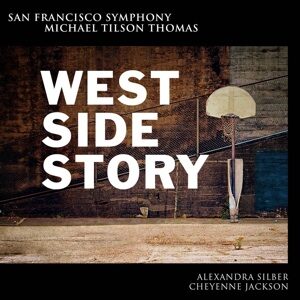In an interview included in this release’s smartly produced booklet, Michael Tilson Thomas responds to Leonard Bernstein’s speculation that West Side Story would “change the face of American musical theater” with this shrewd observation: “That didn’t really happen. West Side Story is a stand-alone piece. Bernstein never wrote anything like it again. And although others have tried, nobody succeeded in doing something similar.” This, I think, is exactly the answer. There are certain pieces of music that are simply so “right” for their time and place, that capture a style or create a distinctive idiom with such inevitability, that they seem not so much “composed”, but rather it’s as if they emerged fully formed through a process of spontaneous generation. Stravinsky’s The Rite of Spring may be the iconic example of this phenomenon, but West Side Story is surely another. It encapsulates a special moment in American musical culture, and for that reason it remains unique, and unrepeatable.
It’s precisely for this reason that the piece works in concert, where the focus necessarily shines the spotlight on that remarkable music to the exclusion of all else, and in this respect Tilson Thomas has made all of the right decisions. He plays the original Broadway score, and has selected a cast of trained Broadway voices. The result couldn’t be more different from Bernstein’s “definitive” DG recording, with his miscast operatic leads, however beautifully sung it was in the abstract. As Maria, Alexandra Silber reveals a pure and lovely soprano that soars above the orchestra effortlessly. When she sings “I feel pretty” you believe her completely. As Tony, Cheyenne Jackson creates a character nicely poised between a man and a kid–no small feat for a guy who in real life is two decades older than the role he’s playing. His initial meeting with Maria has an affectingly bashful, “gee whiz” quality.
The voice, though, is a bit odd: smoothly baritonal in its low register, and almost countertenorish when pressed on high. At times he seems like two different people, but this is, in its way, a typical Broadway sound–that shift from “character” to “singer”. Justin Keyes, who sings Action in “Gee, Officer Krupke”, has a voice of similar shape. He starts each verse with a gravelly sprechstimme, and then all of a sudden opens up and sings as the main melody takes off. Ultimately if this is a fault, and I’m not sure it is or feel we even need to care about it particularly, then it must be Bernstein’s: the songs demand both qualities, “face” and musicianship, shifting blithely back and forth between them. Bernstein’s decision to go whole hog with operatic singers the last time around and jettison the authentic Broadway style was an experiment that arguably lost more than it gained, even in musical terms.
The remaining cast members, including Jessica Vosk’s Anita and Julia Bullock singing a truly beautiful “Somewhere”, are all excellent and thoroughly inside their parts. I was particularly pleased that Tilson Thomas did not permit the girls in “America” to shriek and scream “Puerto Ricanly” as Bernstein did, thus allowing us to hear the marvelous orchestration in the orchestral interludes. Even more than in Bernstein’s more aggressive, almost heavy-handed DG production, MTT captures the work’s sophistication, stylishness, spontaneity, and sheer, easy melodic flow, while the playing of the San Francisco Symphony is simply beyond criticism. You won’t hear the orchestral numbers–the dances in the gym, or the ballet sequence in Act 2–done better, anywhere.
Recorded live before a very quiet audience (there are a few moments of gentle laughter here and there), the sonics capture both singers and players up close, but never harshly. If you want West Side Story complete, then this is the set to own.
































